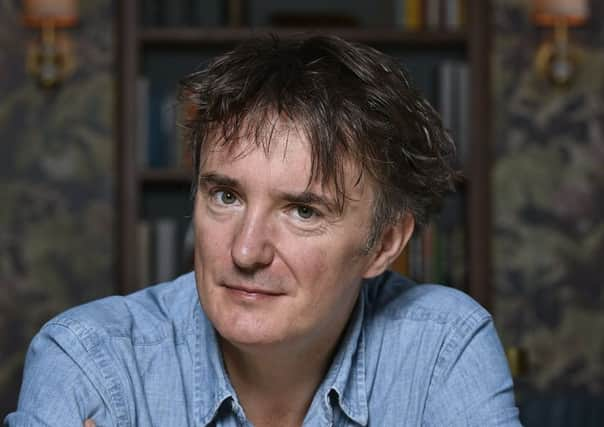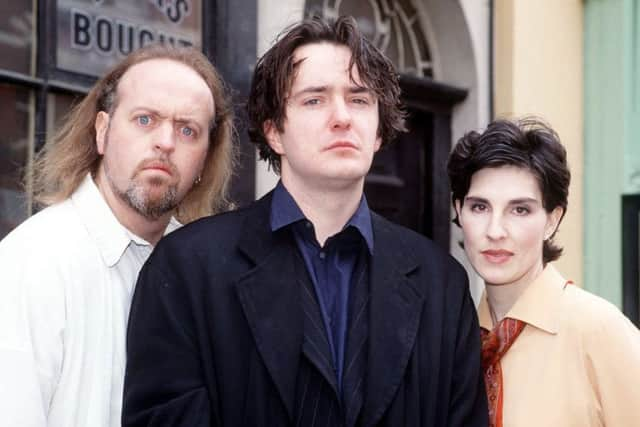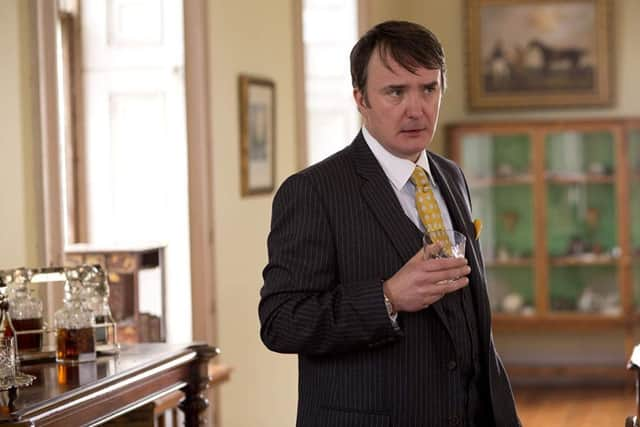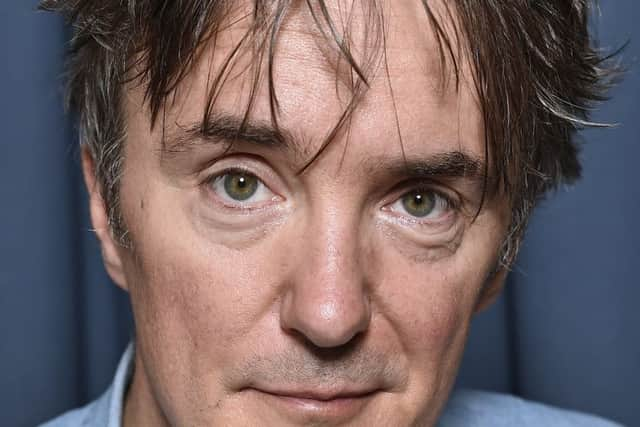Interview: Dylan Moran brings new show Dr Cosmos to the Fringe


‘How do you do what you do, take this and make it into something?” asks Irish comedian, writer, actor and filmmaker Dylan Moran half way through an hour and 45 minutes of cosmos-ranging chat. On reflection, looking at the resulting 29 A4 pages of notes, the short answer is you can’t. There isn’t the time and space to do it justice. So I’ll give you the short version – just go and see Dylan Moran’s new show, Dr Cosmos. It’s about how we live now, and how we try to cope with it. It’ll be thought-provoking and funny. In the meantime here’s a flavour. “Dylan Moran, pleased to meet you. This is it. I’m a lump. I don’t like hanging off things or holding kittens,” he says by way of introduction to the photographer.
We don’t have kittens and there will definitely be no hanging off anything in the swanky new bar/brasserie of the Balmoral Hotel in Edinburgh’s Princes Street, so it’s a simple businesslike matter of posing for pictures then cracking on with the interview.
Advertisement
Hide AdAdvertisement
Hide AdThe comedian from Navan in County Meath has been giving us his take on life and other absurdities since he became the youngest ever winner of the Perrier award at the 1996 Edinburgh Fringe. As well as co-writing and starring in the Bafta-winning Black Books, he appeared in Notting Hill, Shaun of the Dead, Run Fatboy Run and more recently the Irish-set satire, Calvary. He’s toured his comedy shows from Canada to Kazakhstan, with his 2016 Off the Hook tour taking in 149 dates worldwide. His new show, Dr Cosmos will be at various venues at the Edinburgh Fringe this month, then at 42 venues around the UK before touring internationally next year.


Wearing his trademark dark jacket and jeans, at 46 looking bright-eyed and healthier of late since a dry January rolled on into a dry summer, he’s ready to tell me about Dr Cosmos. But first he’s ordering coffee, no wait, before that he’s had a thought.
“You don’t leave your phone on record when you go to the toilet or to order coffee do you?” he says. “Someone did that to me once and I thought it was rather a rookie move and let them know I thought it was bad journalism…”
Er no.


“Do you think the press culture has changed?” he says, and we’re off. Moran is a thinker and a talker and not only that, he wants your opinion too. It’s clear this will be less interview, more conversation that takes in subjects as varied as press freedom and “the bum phenomenon”. In passing there’s John Cleese’s recent railing against the BBC, Ally Sloper’s Half Holiday, a 19th century comic featuring a prototype Andy Capp, yellow press scurrility and the crucial need to hold the powerful to account. Then just as you’re sitting back to enjoy the ride, he hits you with a question, yes, you at the back, why is the media under scrutiny now?
We talk phone hacking and the necessity of a strong press when “we’re leaderless” – Trump is mentioned and dismissed as a pantomime horse, then the internet intercedes.
“It’s changed the way we inhabit time,” he says. “Sit down and crack open a Henry James novel and marvel at the dilation of time itself, leisure as people enjoyed it, the hours that pass, to figure out…[his speech slows to Henry James time] … if Henry has finished his particular sentence or not.
Advertisement
Hide AdAdvertisement
Hide Ad“Now we inhabit tiny, tiny loops, it’s like being on the Wurlitzers in the fairground, that’s your ride with the information, whereas we used to contemplate. Things are more and more compressed. Acceleration and complexity, atomisation, it’s more granular, smaller and smaller. There’s more of it and your focus is rendered impossible in any direction. And the circles are still radiating out from the drop in. There’s the inner life, then the world, and now the virtual world on top. It’s wider not deeper, it’s a shallower experience. So when we’re having emotional times, life and death moments, we’re less prepared for them, because we haven’t had slow time. When icebergs appear they’re overwhelming because we’re so used to shallow, popcorn thoughts and feelings.”


A response is required, but I need to let this percolate.
“So do I,” he says, mercifully. “This is what I do. I talk things out to figure them out, but...” he stops, takes a breath and says. “Anyway... hi.”
We’ve already been talking for ten minutes. He laughs. “People tell me I’m too intense.”
He’s not, he’s fascinating, and funny, with a laugh that starts out with an upwards breathless wheeze, lands as a loud ha, ha, ha! then takes off again into an intake of breath. You could quite happily sit and listen to Moran talk things out, figure them out for hours on end, but I’m sure he has more pressing things to do, like get back to the home he shares in Edinburgh with his wife Elaine and teenage offspring, and finish writing his show. So in a bid to rein things in, I ask him to tell us about Dr Cosmos, billed as a snake oil salesman therapist who is not what he seems, in a show that explores the themes of love, politics, misery, coping with life and everyday absurdities.


“I’ve been researching Dr Cosmos for about 20 years and it really helps sometimes to have a rubric to hang it all off, an identity. It’s much easier to walk on stage as Dr Cosmos than as Dylan Moran [the way he says it, the Moran is Morn, with the emphasis on the first syllable]. I’m just a 46-year-old lumpy dad, who the f*** wants to listen to me? I’m just wandering about looking for cornflakes… But Dr Cosmos....
“It’s about sanity, it’s about now, how we’re living. It’s set in a therapist’s office because that’s a good way into the world of politics, through his clients.”
Dr Cosmos is the name of the show, and also of the small book Moran published, with some of his own illustrations, and it’s also the title of the TV programme for which he’s written the pilot.
Advertisement
Hide AdAdvertisement
Hide Ad“It’s a drama, but funny, a comedy drama, I don’t know what the f*** it is, but it’s the best thing I’ve ever written,” he says. “I always wanted to make something that was super-adaptable and could go in different directions.”
With both personal and political crises kicking off all over the place, Moran feels the time is right to ask questions about life, the universe and mental health. Then there’s the internet generation and the “bum phenomenon”.
”That’s new,” he says. “I go on Instagram to post my cartoons and see a picture of a perfectly respectably fine human arse, and then next to it an ‘after’ picture and I’m supposed to be impressed because it’s two and a half times bigger! They both look lovely and I’m sure they’re excellent for purpose, but that’s people trying to answer reality – they think reality is saying to them your arse isn’t as it should be! The arse as the philosopher’s stone of the body, it’s never right.”
He laughs, then is serious again. “So strong man politics has taken over the world and it’s on the therapist’s couch because we’re all experiencing deep dysfunction. We know things are awry but we don’t know what to do.
“What the f*** are we doing? Trying to figure this stuff out, this is what I do, it’s my job, my life,” he says. “I don’t know. I’m just a guy talking.”
Given his keen interest in psychoanalysis and multiple references, has he had therapy himself?
Advertisement
Hide AdAdvertisement
Hide Ad“Sure I have, it’s been very useful, everybody should. I think it helps, I think it can save your life.”
But Moran is not so much interested in his own personal experience apart from where it conflates with everyone else’s.
“I don’t want to get up on stage and tell you what happened to me on Thursday, I want to tell you what happened to YOU on Thursday. I’m interested in what you and I BOTH know. Comedy’s about recognition, holding up a mirror. And it’s an excellent time to be funny because there’s a terrible amount of pain in the world. Laughter is a balm.”
One of Moran’s big themes is the changing world we live in and how we struggle to cope in the West.
“We think of ourselves as the freest people in the world, pioneering individualism, yet we talk about loneliness. That’s the flip side of the development of the self. It’s almost like we’ve reached peak self, and we’re trying to find what community is left…
“Our politics are broken, our family structures smudged, the institutions we use to bind us, like marriage, only work half the time, so we need new configurations on how to live sanely. There’s a lot of talk, a lot of it is hipster wank and Scandi cool, but people are losing their f***ing minds, so they’re not coming up with this for the craic, but because we need to.”
Faced with the insanity on multiple levels, Moran copes with it “by talking to people and working things out, by writing about it. You don’t bother to write something like Dr Cosmos unless you’re pretty angry.”
Advertisement
Hide AdAdvertisement
Hide AdIf Moran sounds bleak he doesn’t come across like that, maybe because it’s a bleakness leavened by humour, a darkness shot through with hilarity, and if anyone’s offended, he’s not worried, he’s doing them a favour.
“They attack you because they’re so full of things they want to say themselves but have never been allowed to. There’s a story about RD Laing [the Scottish psychotherapist], one of the figures I had in mind for Dr Cosmos, who came across a consultant in Glasgow who used to get patients on his medical ward saying God was punishing them. So he would inject 10cc of turpentine into their buttocks to inflame them and that would make the guys happy because it simulated the effects of hellfire and they’d go away happy.”
He laughs. “These institutions, you have to part a veil to see what’s going on, and when everything you’ve ever heard falls away, you see the reality. You may only get a handful of these times in your life and it can be frightening. It’s exhilarating too. You get a sense of your fragility and how out of control everything is and you’re truly alive. And at those times we turn to humour, because in laughter we are not alone.”
Heavy stuff, something Moran acknowledges.
“Yes, this is analysis and no good on stage. It’d bore the bejesus out of people and they’d say f***’s sake, make me laugh. So I go through all the shit, dive into the dirty laundry and try to find ways of coping with it.
“I think there’s three ways to go: there’s you, you with other people and death. Three doors, pick a door. Where else is there to go?”
Despite the talk of death, Moran is only 46 yet he’s been pondering middle age of late, especially since he’s just back from playing Latitude Festival.
“It was ‘who are all these children and who gave them guitars?’ And people finding new places on themselves that are pierceable. Well you’re constantly asking is it me or the world? Because your vantage point has changed. You know you wouldn’t talk to yourself at 20 for five straight minutes without wanting to hit yourself.”
Advertisement
Hide AdAdvertisement
Hide AdFaced with the prospect of meeting a younger self who’d just won the Perrier, Moran says: “I’d laugh my arse off and then I’d kick him in the balls probably.”
And does he think his younger self would reciprocate?
“Well, to be honest with you, I dunno. I mean you look back and see yourself as a young guy who was covering a lot of stuff and trying to get through.”
So if he could live his life over again, what would he change? This time there is little rumination and he comes straight back with...
“Everything! I never understand when people say I wouldn’t change a thing, what kind of f***ing moron are you? I get tired even thinking about all the things I’d change! I’d have spent less time smoking and drinking, I wouldn’t have worried so much, you waste decades doing that.
“The act I had, the comic persona was all about being bulletproof, that drunk thing, you’re rubber, it’s a joke. And it was great fun, I loved being in the eye of the story, and in Black Books with Bill [Bailey] and Tamsin [Greig] because they’re such amazing performers.
“And you just do it, you could be up, down, sick, feeling great, losing your mind, the audience wouldn’t know. Then you have to stop, because they would start to know. Tony Bennett used to say you don’t sing your scales the first day, nobody knows; you don’t sing your scales the next day, the band knows; you don’t sing your scales all week, everybody knows. It’s the simplest thing in the world distinguishing what’s real from what’s not, but it’s not, it’s an effort to separate stage you from you you.”
Advertisement
Hide AdAdvertisement
Hide AdWhich is where an alter ego is handy and Dr Cosmos is the way to go. After the tour, Moran will see what comes up next. Would he like to do more TV or film?
“I don’t give a f***, all that stuff, they can ring me, or not,” he says, mildly.
Yes, but everyone has to live.
“Don’t worry I’ll live,” he says pleasantly. “Like everybody else, I want more than I should have, but I’m not very driven. I don’t want to be very rich, I wouldn’t know what to do with it. The things I enjoy most in the world are pens and pencils, art materials, some music, that’s about it. I’m a child really.
“And I’m going to make the Dr Cosmos programme, if I have to make it with Romanian television, I will. And if anybody’s brave enough they should give me a call because it’s full of mental health, sex, violence, crime, madness, politics. It’s everything that is now.”
• Dylan Moran will perform Dr Cosmos at The Edinburgh Fringe at various locations from 14-26 August, tickets.edfringe.com, www.edfringe.com and as part of the UK tour at Glasgow, Theatre Royal on 14 and 15 September www.atgtickets.com/venues/theatre-royal-glasgow and www.dylanmoran.com,• Thanks to The Balmoral, Edinburgh, Brasserie Prince by Alain Roux, www.roccofortehotels.com